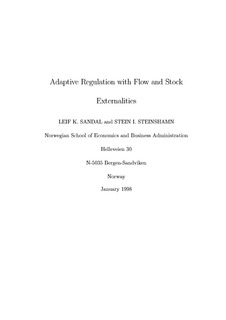Adaptive regulation with flow and stock externalities
Working paper
Permanent lenke
http://hdl.handle.net/11250/164087Utgivelsesdato
1998-01Metadata
Vis full innførselSamlinger
- Discussion papers (FOR) [566]
Sammendrag
In confronting a consumer good whose production process is associated with both flow and stock externalities, a corrective tax is introduced to restore efficiency. The objective is to maximize social welfare over time when the stock pollutant obeys an arbitrary dynamic process. The model makes it possible to derive the optimal corrective tax as a closed form feedback control law. This feedback rule can be applied for qualitative purposes such as parameter analysis or studying the time path of the corrective tax. It can also be used for quantitative purposes, for example evaluating an actual policy or assessment of the optimal tax for a certain case. It is here used to study how the optimal corrective tax, both as a function of time and as a function of the pollution level, depends upon the decay function. It is shown that, depending upon the initial conditions and the structure of the economy and the decay function, most outcomes are possible.
Utgiver
Norwegian School of Economics and Business Administration. Department of Finance and Management ScienceSerie
Discussion paper1998:1
